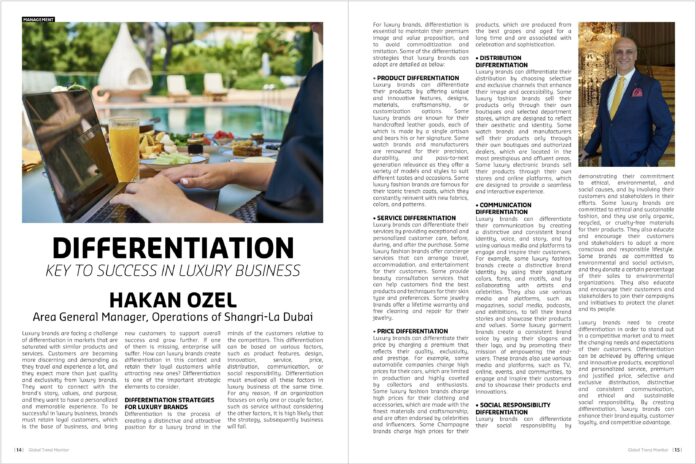Hakan Ozel, Area General Manager, Operations of Shangri-La Dubai
Luxury brands are facing a challenge of differentiation in markets that are saturated with similar products and services. Customers are becoming more discerning and demanding as they travel and experience a lot, and they expect more than just quality and exclusivity from luxury brands. They want to connect with the brand’s story, values, and purpose, and they want to have a personalized and memorable experience. To be successful in luxury business, brands must retain loyal customers, which is the base of business, and bring new customers to support overall success and grow further. If one of them is missing, enterprise will suffer. How can luxury brands create differentiation in this context and retain their loyal customers while attracting new ones? Differentiation is one of the important strategic elements to consider.
Differentiation strategies for luxury brands
Differentiation is the process of creating a distinctive and attractive position for a luxury brand in the minds of the customers relative to the competitors. This differentiation can be based on various factors, such as product features, design, innovation, service, price, distribution, communication, or social responsibility. Differentiation must envelope all these factors in luxury business at the same time. For any reason, if an organization focuses on only one or couple factor, such as service without considering the other factors, it is high likely that the strategy, subsequently business will fail.
For luxury brands, differentiation is essential to maintain their premium image and value proposition, and to avoid commoditization and imitation. Some of the differentiation strategies that luxury brands can adopt are detailed as below:
- Product differentiation: Luxury brands can differentiate their products by offering unique and innovative features, designs, materials, craftsmanship, or customization options. Some luxury brands are known for their handcrafted leather goods, each of which is made by a single artisan and bears his or her signature. Some watch brands and manufacturers are renowned for their precision, durability, and pass-to-next generation relevance as they offer a variety of models and styles to suit different tastes and occasions. Some luxury fashion brands are famous for their iconic trench coats, which they constantly reinvent with new fabrics, colors, and patterns.
- Service differentiation: Luxury brands can differentiate their services by providing exceptional and personalized customer care, before, during, and after the purchase. Some luxury fashion brands offer concierge services that can arrange travel, accommodation, and entertainment for their customers. Some provide beauty consultation services that can help customers find the best products and techniques for their skin type and preferences. Some jewelry brands offer a lifetime warranty and free cleaning and repair for their jewelry.
- Price differentiation: Luxury brands can differentiate their price by charging a premium that reflects their quality, exclusivity, and prestige. For example, some automobile companies charge high prices for their cars, which are limited in production and highly coveted by collectors and enthusiasts. Some luxury fashion brands charge high prices for their clothing and accessories, which are made with the finest materials and craftsmanship, and are often endorsed by celebrities and influencers. Some Champagne brands charge high prices for their products, which are produced from the best grapes and aged for a long time and are associated with celebration and sophistication.
- Distribution differentiation: Luxury brands can differentiate their distribution by choosing selective and exclusive channels that enhance their image and accessibility. Some luxury fashion brands sell their products only through their own boutiques and selected department stores, which are designed to reflect their aesthetic and identity. Some watch brands and manufacturers sell their products only through their own boutiques and authorized dealers, which are located in the most prestigious and affluent areas. Some luxury electronic brands sell their products through their own stores and online platforms, which are designed to provide a seamless and interactive experience.
- Communication differentiation: Luxury brands can differentiate their communication by creating a distinctive and consistent brand identity, voice, and story, and by using various media and platforms to engage and inspire their customers. For example, some luxury fashion brands create a distinctive brand identity by using their signature colors, fonts, and motifs, and by collaborating with artists and celebrities. They also use various media and platforms, such as magazines, social media, podcasts, and exhibitions, to tell their brand stories and showcase their products and values. Some luxury garment brands create a consistent brand voice by using their slogans and their logo, and by promoting their mission of empowering the end-users. These brands also use various media and platforms, such as TV, online, events, and communities, to engage and inspire their customers and to showcase their products and innovations.
- Social responsibility differentiation: Luxury brands can differentiate their social responsibility by demonstrating their commitment to ethical, environmental, and social causes, and by involving their customers and stakeholders in their efforts. Some luxury brands are committed to ethical and sustainable fashion, and they use only organic, recycled, or cruelty-free materials for their products. They also educate and encourage their customers and stakeholders to adopt a more conscious and responsible lifestyle. Some brands ae committed to environmental and social activism, and they donate a certain percentage of their sales to environmental organizations. They also educate and encourage their customers and stakeholders to join their campaigns and initiatives to protect the planet and its people.
Luxury brands need to create differentiation in order to stand out in a competitive market and to meet the changing needs and expectations of their customers. Differentiation can be achieved by offering unique and innovative products, exceptional and personalized service, premium and justified price, selective and exclusive distribution, distinctive and consistent communication, and ethical and sustainable social responsibility. By creating differentiation, luxury brands can enhance their brand equity, customer loyalty, and competitive advantage.
